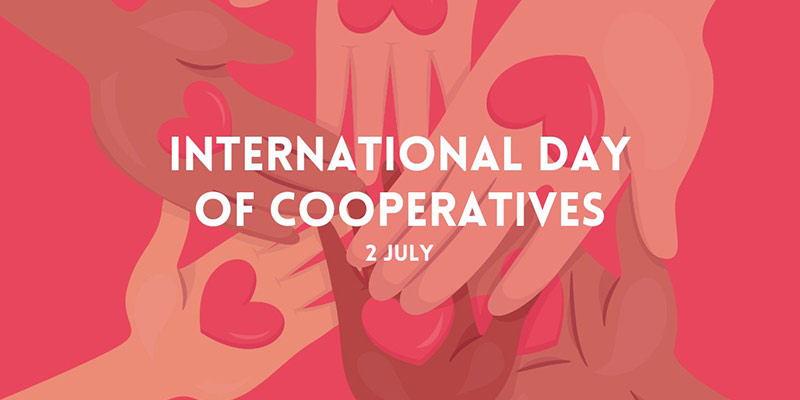- India
- Jul 04
Explainer / Importance of cooperative societies
Union Cooperation Minister Amit Shah addressed a conference to commemorate the 100th International Day of Cooperatives in New Delhi.
The United Nations celebrates the International Day of Cooperatives annually on the first Saturday of July.
The aim of the Day is to increase awareness of cooperatives and promote the movement’s ideas of international solidarity, economic efficiency, equality, and world peace.
The cooperatives movement
• Cooperatives have been acknowledged as associations and enterprises through which citizens can effectively improve their lives while contributing to the economic, social, cultural and political advancement of their community and nation.
• The cooperative movement has been also recognised as a distinct and major stakeholder in both national and international affairs.
• Cooperatives’ open membership model affords access to wealth creation and poverty elimination. This results from the co-operative principle of members’ economic participation: ‘Members contribute equitably to, and democratically control, the capital of their co-operative’.
• Because cooperatives are people-centered, not capital-centered, they do not perpetuate, nor accelerate capital concentration and they distribute wealth in a more fair way.
• Cooperatives also foster external equality. As they are community-based, they are committed to the sustainable development of their communities — environmentally, socially and economically. This commitment can be seen in their support for community activities, local sourcing of supplies to benefit the local economy, and in decision-making that considers the impact on their communities.
• Despite their local community focus, cooperatives also aspire to bring the benefits of their economic and social model to all people in the world.
• The cooperative movement is highly democratic, locally autonomous, but internationally integrated, and a form of organisation of associations and enterprises whereby citizens themselves rely on self-help and their own responsibility to meet goals that include not only economic, but also social and environmental objectives, such as overcoming poverty, securing productive employment and encouraging social integration.
Ministry of cooperation
• In July 2021, the Modi government created a separate ministry — ministry of cooperation — for strengthening cooperative movement in the country.
• The ministry was created by transferring the entries related to cooperation in the business of the erstwhile ministry of agriculture, cooperation and farmers welfare.
• The ministry is responsible to provide a separate administrative, legal and policy framework for strengthening the cooperative movement in the country.
• It aims to deepen cooperatives as a true people-based movement reaching up to the grassroots and develop a cooperative based economic model where each member works with a spirit of responsibility.
• The principal activities of the ministry include streamlining processes for ‘Ease of Doing Business’ for cooperatives and enabling development of multi-state cooperative societies.
• It lays emphasis on strengthening, bringing transparency, modernisation, computerisation, creating competitive cooperatives, working constantly to meet the challenge of accessibility to development for every underprivileged in rural areas and on connecting every village with cooperatives, making every village prosperous with the mantra of “Sahakar se Samriddhi” and through this making the country prosperous.
• According to the ministry, the cooperative movement in India is the largest in the world.
• At present, cooperatives in India with a network of over 8.5 lakh covering 90 per cent of the villages, are pivotal institutions for bringing socio-economic development for inclusive growth in both rural and urban areas. Around 12 crore people are linked directly with this sector.
• AMUL, IFFCO, KRIBHCO, NAFED, etc are some of the well-known success stories of the cooperative movement in India.
97th Constitutional Amendment
• In July 2021, the Supreme Court quashed certain provisions of the 97th Constitutional Amendment related to functioning and effective management of cooperative societies for want of ratification by half of the states.
• The top court, however, held that Part IXB of the Constitution, which dealt with functioning and incorporation of multi-state co-operative societies, will be operative.
• The cooperative movement in India can be legislatively traced to two British Acts, namely, the Cooperative Societies Act, 1904 and the Co-operative Societies Act, 1912.
• Under the Government of India Act, 1919, the subject ‘cooperative societies’ was contained in Entry 13 of the provincial list. This was continued by the Government of India Act, 1935, ‘cooperative societies’ being contained in Entry 33 of the provincial list.
• This was then further continued by the Constitution of India.
• The cooperative societies is a subject enumerated in Entry 32 of the State List of the Seventh Schedule of the Constitution.
• The 97th Constitutional Amendment, which dealt with issues related to effective management of cooperative societies in the country was passed by Parliament in December 2011 and had come into effect from February 15, 2012.
• The then UPA government said there was a need to initiate fundamental reforms to revitalise these institutions in order to ensure their contribution in the economic development of the country, and to serve the interests of members and public at large, and also to ensure their autonomy, democratic functioning and professional management.
• The change in the Constitution has amended Article 19(1)(c) to give protection to the cooperatives and inserted Article 43 B and Part IXB, relating to them.
• While Article 19(1)(c) guarantees freedom to form associations or unions or cooperative societies subject to certain restrictions, Article 43 B says that states shall endeavour to promote voluntary formation, autonomous functioning, democratic control and professional management of cooperative societies.
• The Part IXB of the Constitution inserted by 97th Amendment deals with incorporation, terms of members of board and its office bearers and effective management of cooperative societies.
• The Part IXB contained Articles 243ZH to Article 243ZT, which empowered Parliament (for multi-state cooperative societies) and state legislatures for other cooperative societies to make laws.
Manorama Yearbook app is now available on Google Play Store and iOS App Store

